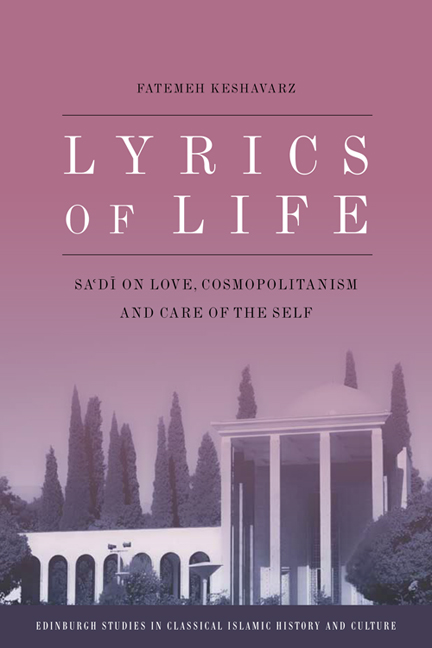Book contents
- Frontmatter
- Contents
- Acknowledgments
- 1 At the Brink of Writing: Which Doors to Open First?
- 2 Cosmopolitan Kinship: The Making of a Multi-world Subjectivity in the Poetry of Sa'di
- 3 Sa'di on Care of the Self: Ethical Games of Power in Practice of Freedom
- 4 “Every New Flower Arriving in the World”: Sa'di and the Art of Ghazal Writing
- 5 Gazing at the Garden of Your Beauty: Love in the Garden
- 6 My Poor Heart Sometimes Runs, Sometimes Whirls: Meet Sa'di the Comedian
- 7 Epilogue: Leaving the Garden Already? Here Are a Few Things I Hope You Take Along
- Bibliography
- Index
2 - Cosmopolitan Kinship: The Making of a Multi-world Subjectivity in the Poetry of Sa'di
Published online by Cambridge University Press: 05 August 2016
- Frontmatter
- Contents
- Acknowledgments
- 1 At the Brink of Writing: Which Doors to Open First?
- 2 Cosmopolitan Kinship: The Making of a Multi-world Subjectivity in the Poetry of Sa'di
- 3 Sa'di on Care of the Self: Ethical Games of Power in Practice of Freedom
- 4 “Every New Flower Arriving in the World”: Sa'di and the Art of Ghazal Writing
- 5 Gazing at the Garden of Your Beauty: Love in the Garden
- 6 My Poor Heart Sometimes Runs, Sometimes Whirls: Meet Sa'di the Comedian
- 7 Epilogue: Leaving the Garden Already? Here Are a Few Things I Hope You Take Along
- Bibliography
- Index
Summary
I am about to open this chapter on Sa'di's cosmopolitan worldview with a reference to one of his contemporary poets. Unusual as it may be, there is a good reason for it. The celebrated poet, and mystic, whom Persian speakers call Mowlaanaa Jalaal al-Din Mowlavi is known by two equally well-known patronymics, Balkhi and Rumi, associating him with two major geographical regions thousands of miles apart. These two regions could be described as located approximately at the two ends of an important pre-modern highway that, in our time, has come to be celebrated as the Silk Road. Balkh is in present-day Afghanistan and Rum (referring to Anatolia) in the country that the world now knows as Turkey. The Silk Road, which in the 1200s brought a gift as precious as the young Rumi (together with his family) from the eastern borders of the Islamdom to its west, was one of many cultural and commercial arteries that transported cosmopolitan vibrancy, among other things. I will say more about the Silk Road later but the example from Rumi will show that Sa'di was nourished by a literary/cultural tradition that possessed a cosmopolitan mind.
The main focus of this chapter, however, will be on the ways in which our poet Sa'di of Shiraz imagined himself as an inhabitant of a diverse and cosmopolitan world. This was a world aware of and sensitive to the presence of others living elsewhere. From his perspective, life was not to be shaped solely by the values of local personalities and their practices. Rather, the ideal situation was to explore different worlds, to learn, to suffer if need be, and ultimately to acquire a multi-world subjectivity. This, as we will see, was not motivated by a romantic notion of approving or embracing all different ways of life. Rather, it was an attempt to know and to taste the fruits that life has to offer whether concrete or metaphorical.
- Type
- Chapter
- Information
- Lyrics of LifeSa'di on Love, Cosmopolitanism and Care of the Self, pp. 42 - 78Publisher: Edinburgh University PressPrint publication year: 2014

